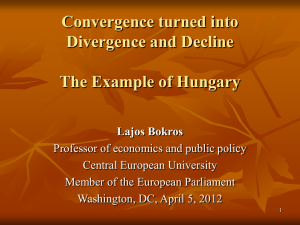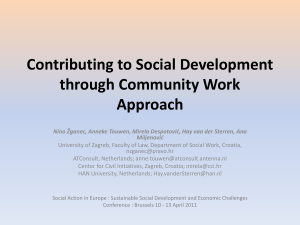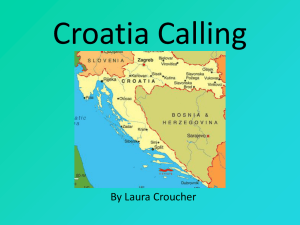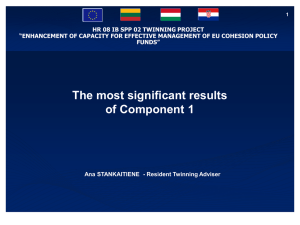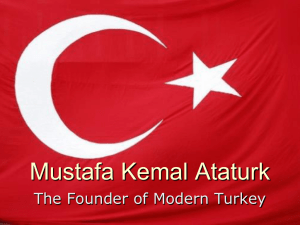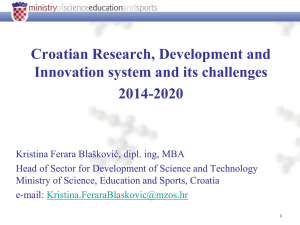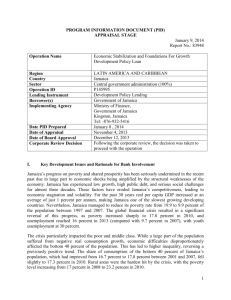Program Information Document
advertisement
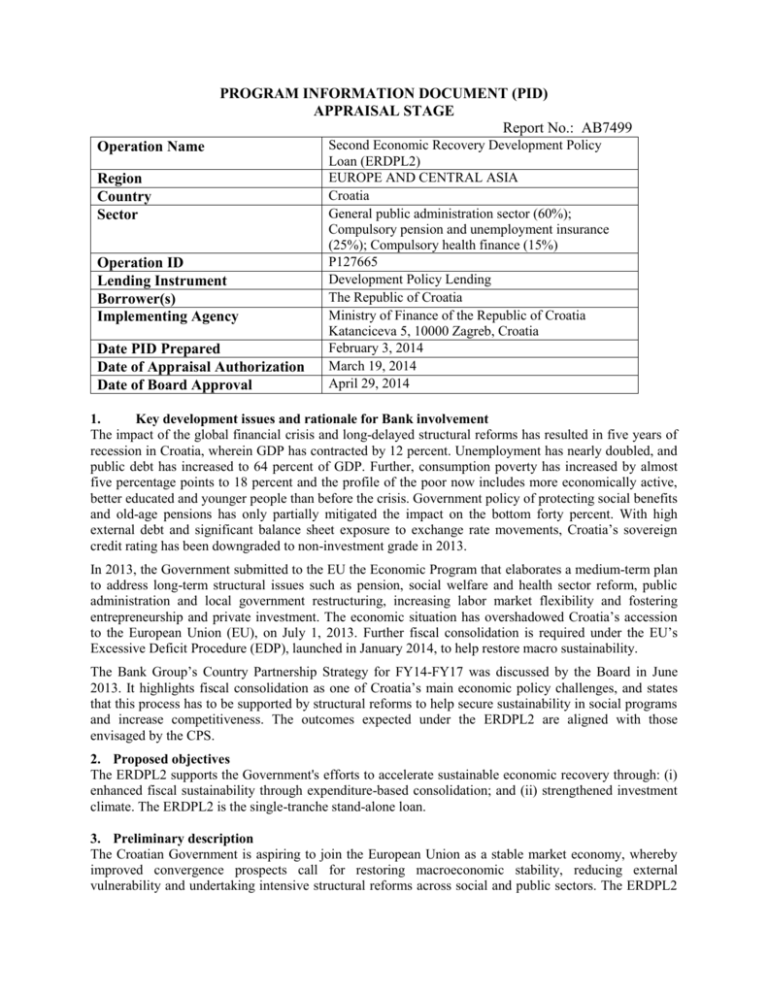
PROGRAM INFORMATION DOCUMENT (PID) APPRAISAL STAGE Report No.: AB7499 Operation Name Region Country Sector Operation ID Lending Instrument Borrower(s) Implementing Agency Date PID Prepared Date of Appraisal Authorization Date of Board Approval Second Economic Recovery Development Policy Loan (ERDPL2) EUROPE AND CENTRAL ASIA Croatia General public administration sector (60%); Compulsory pension and unemployment insurance (25%); Compulsory health finance (15%) P127665 Development Policy Lending The Republic of Croatia Ministry of Finance of the Republic of Croatia Katanciceva 5, 10000 Zagreb, Croatia February 3, 2014 March 19, 2014 April 29, 2014 1. Key development issues and rationale for Bank involvement The impact of the global financial crisis and long-delayed structural reforms has resulted in five years of recession in Croatia, wherein GDP has contracted by 12 percent. Unemployment has nearly doubled, and public debt has increased to 64 percent of GDP. Further, consumption poverty has increased by almost five percentage points to 18 percent and the profile of the poor now includes more economically active, better educated and younger people than before the crisis. Government policy of protecting social benefits and old-age pensions has only partially mitigated the impact on the bottom forty percent. With high external debt and significant balance sheet exposure to exchange rate movements, Croatia’s sovereign credit rating has been downgraded to non-investment grade in 2013. In 2013, the Government submitted to the EU the Economic Program that elaborates a medium-term plan to address long-term structural issues such as pension, social welfare and health sector reform, public administration and local government restructuring, increasing labor market flexibility and fostering entrepreneurship and private investment. The economic situation has overshadowed Croatia’s accession to the European Union (EU), on July 1, 2013. Further fiscal consolidation is required under the EU’s Excessive Deficit Procedure (EDP), launched in January 2014, to help restore macro sustainability. The Bank Group’s Country Partnership Strategy for FY14-FY17 was discussed by the Board in June 2013. It highlights fiscal consolidation as one of Croatia’s main economic policy challenges, and states that this process has to be supported by structural reforms to help secure sustainability in social programs and increase competitiveness. The outcomes expected under the ERDPL2 are aligned with those envisaged by the CPS. 2. Proposed objectives The ERDPL2 supports the Government's efforts to accelerate sustainable economic recovery through: (i) enhanced fiscal sustainability through expenditure-based consolidation; and (ii) strengthened investment climate. The ERDPL2 is the single-tranche stand-alone loan. 3. Preliminary description The Croatian Government is aspiring to join the European Union as a stable market economy, whereby improved convergence prospects call for restoring macroeconomic stability, reducing external vulnerability and undertaking intensive structural reforms across social and public sectors. The ERDPL2 supports policy actions from the Government’s 2013 Economic Program, which focuses largely on medium- to longer-term measures that aim to: (i) Enhance fiscal sustainability through expenditure-based consolidation in public administration and social sectors, as well as through strengthening the fiscal responsibility framework; and (ii) Strengthen investment climate through labor market, privatization and business environment reforms. 4. Poverty and Social Impacts and Environment Aspects 5. The impact of measures supported by the ERDPL2 on the poor and the bottom 40 percent is neutral or positive, although the ongoing recession and fiscal consolidation continue to affect these groups. They are mostly addressing existing overly generous privileges or mis-targeting of benefits, and thus their adverse impacts are confined to upper income quintiles. For example, through social welfare and pension reforms, the ERDPL2 supports the improved targeting and coverage of social benefits, reduced privileged pensions as well as strengthened pension replacement rates due to longer labor market participation. Both pension and the social welfare reforms aim to improve the prospects for the eradication of extreme poverty by protecting the relative value of the poverty benefit and by incentivizing people (in particular women) to stay longer at the labor market and thus generate higher benefits at the time of retirement. Increased hiring flexibility and improved business climate support investment and job creation for shared prosperity. The proposed support to the budget and policy reforms has been screened against OP 8.60 and shows that the proposed policy reforms are not likely to cause significant effects on the country’s environment, forests, and other natural resources. 5. Tentative financing Source: Borrower International Bank for Reconstruction and Development Total 6. Contact point World Bank Contact: Sanja Madzarevic-Sujster Title: Senior Country Economist Tel: 5240+7260 Email: smadzarevic@worldbank.org Location: Zagreb, Croatia (IBRD) 7. For more information contact: The InfoShop The World Bank 1818 H Street, NW Washington, D.C. 20433 Telephone: (202) 458-4500 Fax: (202) 522-1500 Email: pic@worldbank.org Web: http://www.worldbank.org/infoshop Borrower Contact: Mr. Maroje Lang Title: Assistant Minister of Finance Tel: +385-1-4591 258 Email: maroje.lang@mfin.hr (€m.) 0 150 150
